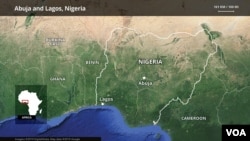Extremist rebels killed at least seven farmers in northeast Nigeria, an attack that further threatens food security in the hard-hit region, local authorities told The Associated Press on Friday.
The militants attacked the farmers on Thursday as they worked on their crop fields near Borno state's Molai area, the authorities said.
Security forces deployed to the scene “were met with a horrifying sight; some victims had their throats slit while others were completely beheaded,” said Abudulmumeen Bulama, a member of the Civilian Joint Task Force that is helping fight the militants.
Sainna Buba, a local government official, described the attack as a “sad occurrence and a setback” to restore peace and farming activities in the troubled region. The victims have been buried, he said.
The attack happened amid state efforts to help farmers and other residents recover from violence and related upheaval in the troubled region. U.N. agencies this week sought more funding for humanitarian assistance.
Islamic extremist rebels launched an insurgency in 2009 in Nigeria's northeast to fight against Western education and to establish Islamic Shariah law in the region.
At least 35,000 people have been killed and more than 2 million displaced because of the violence by the Boko Haram group and a breakaway faction backed by the Islamic State, according to U.N. agencies in Nigeria.
“These attacks are becoming one too many, and the government needs to do something urgently,” farmer Becky Koji said, echoing the concerns of many in the area. “We are not safe anymore”
On Friday, Nigerian soldiers reviewed a large number of farmers in the area and gave them authorization cards for gaining access to their land. The farmers told the AP that security is only provided on the highway and not in crop-growing areas that usually are several kilometers away from main roads.
The militants have often attacked farmers. Aid groups and analysts have expressed concerns that such attacks could cause more hardship for many in the West African nation already struggling with record unemployment and poverty levels.
The U.N. has warned that limited funding could increase the risk of famine.
At least 4.4 million in the troubled region are projected to face acute hunger at the peak of the lean season between June and August this year, the U.N. World Food Program said on Wednesday.




